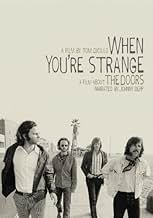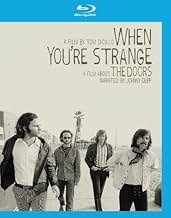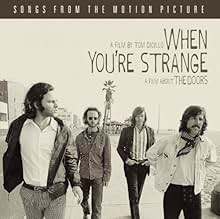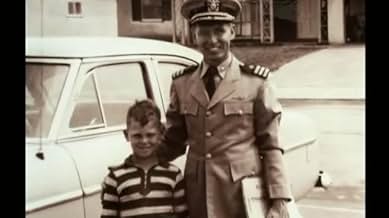NOTE IMDb
7,6/10
10 k
MA NOTE
Ajouter une intrigue dans votre langueA look at the late '60s and early '70s rock band The Doors, including rare exclusive footage.A look at the late '60s and early '70s rock band The Doors, including rare exclusive footage.A look at the late '60s and early '70s rock band The Doors, including rare exclusive footage.
- Réalisation
- Scénario
- Casting principal
- Récompenses
- 2 victoires et 1 nomination au total
Johnny Depp
- Narrator
- (voix)
John Densmore
- Self
- (images d'archives)
Robby Krieger
- Self
- (images d'archives)
Ray Manzarek
- Self
- (images d'archives)
Jim Morrison
- Self
- (images d'archives)
Pamela Courson
- Self
- (images d'archives)
- (as Pam Courson)
The Doors
- Themselves
- (images d'archives)
Murray Goodman
- Self - Judge
- (images d'archives)
Jimi Hendrix
- Self
- (images d'archives)
Lyndon B. Johnson
- Self
- (images d'archives)
- (as Lyndon Johnson)
George S. Morrison
- Self - Jim's Father
- (as Admiral George S. Morrison)
Paul A. Rothchild
- Self
- (images d'archives)
Adolf Hitler
- Self
- (images d'archives)
- (non crédité)
Janis Joplin
- Self
- (images d'archives)
- (non crédité)
John F. Kennedy
- Self
- (images d'archives)
- (non crédité)
Robert F. Kennedy
- Self
- (images d'archives)
- (non crédité)
Avis à la une
I'm a big fan of The Doors and pretty much knew the story before watching this film. And yet I found Johnny Depp to be a very convincing narrator (usually I find narrators to be quite annoying in documentaries!), and the film was quite fluid and easy to watch. Some really cool footage as well! For anyone who's interested, Oliver Stone's 1992 film The Doors is a good and fairly accurate non-documentary worth watching, if you haven't seen it already.
I attended a special screening of the music documentary "When You're Strange: A Film about The Doors" at the 2009 Los Angeles Film Festival. This was my 18th screening here and the first to be completely sold out.
Writer/director Tom DiCillo was able to gain access to original footage shot from 1966-71 by Paul Ferrara, a UCLA Film School buddy of flamboyant lead singer Jim Morrison. Those old, grainy films are all that were needed to make this stunning documentary -- no modern-day or additional footage was shot.
The dramatic voice-over was provided by Johnny Depp who, in a statement from DiCillo read prior to the screening, was the one person the filmmakers felt qualified to narrate the movie. It had to be someone with a passion for the music of The Doors, and Depp fit the bill.
With the assistance of the remaining living members, particularly band co-founder and keyboardist Ray Manzarek (who sat in front of me), the film is destined to be the definitive chronicle of the band's history. We finally discover the shocking truth behind the curious myths -- did Morrison really expose his genitals at that infamous Florida concert? Did he fake his own death? "When You're Strange" separates fact from fiction and puts to rest the many rumors surrounding the manic life and untimely death of Jim Morrison. The heretofore secret details behind the making of each amazing album (one took 11 months, another took less than a week) are mind-boggling. Naturally, there's plenty of music. Tons of it.
Like all music docs, the degree to which one connects with the film is directly proportional to one's familiarity with the music and/or artists featured in the production. This certainly applies here. Like some of the thrilling music documentaries I've seen at festivals in the past couple of years ("The U.S. vs. John Lennon," "Dixie Chicks: Shut Up and Sing," "The Wrecking Crew," "Kurt Cobain About a Son"), I put "When You're Strange" right at the top of my list. I was blown away. However, while I walked away feeling that this was an absolutely brilliant film, I have to give it a qualified thumbs up if only because there is no doubt many simply won't have the emotional response that I did. But, for fans of this music, "When You're Strange" is absolutely a must-see.
Writer/director Tom DiCillo was able to gain access to original footage shot from 1966-71 by Paul Ferrara, a UCLA Film School buddy of flamboyant lead singer Jim Morrison. Those old, grainy films are all that were needed to make this stunning documentary -- no modern-day or additional footage was shot.
The dramatic voice-over was provided by Johnny Depp who, in a statement from DiCillo read prior to the screening, was the one person the filmmakers felt qualified to narrate the movie. It had to be someone with a passion for the music of The Doors, and Depp fit the bill.
With the assistance of the remaining living members, particularly band co-founder and keyboardist Ray Manzarek (who sat in front of me), the film is destined to be the definitive chronicle of the band's history. We finally discover the shocking truth behind the curious myths -- did Morrison really expose his genitals at that infamous Florida concert? Did he fake his own death? "When You're Strange" separates fact from fiction and puts to rest the many rumors surrounding the manic life and untimely death of Jim Morrison. The heretofore secret details behind the making of each amazing album (one took 11 months, another took less than a week) are mind-boggling. Naturally, there's plenty of music. Tons of it.
Like all music docs, the degree to which one connects with the film is directly proportional to one's familiarity with the music and/or artists featured in the production. This certainly applies here. Like some of the thrilling music documentaries I've seen at festivals in the past couple of years ("The U.S. vs. John Lennon," "Dixie Chicks: Shut Up and Sing," "The Wrecking Crew," "Kurt Cobain About a Son"), I put "When You're Strange" right at the top of my list. I was blown away. However, while I walked away feeling that this was an absolutely brilliant film, I have to give it a qualified thumbs up if only because there is no doubt many simply won't have the emotional response that I did. But, for fans of this music, "When You're Strange" is absolutely a must-see.
"When You're Strange" is a music Documentary, which takes you through the short career of a world famous 1960's band, The Doors.
For this alone, the documentary is worth watching. That said, this is so interesting to watch, because it is a story with so many levels, mainly because it took place in a time, when things were changing.
It was the 1960s. A still growing group of people invented in the 50s, namely the young, could and would not be ignored any longer. As Morrison put it: 'we want the world, and we want it now' To them things were not black and white anymore. Men and women were not men and women, but human beings. The solution was definitely not war, but the absolute opposite. On the other hand the parents, and older generations, were stubbornly holding on to the old order and its values, and a larger and larger gap was growing between these two fronts.
The spotlight in this film is heavily focused on the Doors most famous member, Jim Morrison, and for a good reason. Jim Morrison became a clear symbol of the new, and the young, mainly because he wanted more out of life than the norms allowed, and simply went for it. On top of this, Jim had an interesting background, which is a prime example of the generation gap. Jim Morrisons father George Morrison was an admiral in the navy, and was involved in the Vietnam war. He was against Jim's involvement in rock music, wanted his hair cut, and to get an education. Jim ignored his parents to such an extend that he claimed his family dead, when asked by journalists.
If you know the story of The Doors and Jim Morrison already, this will be a stringent summary of the events with a well written and good narration by Johnny Depp. There is nothing new in the story itself and thankfully no conspiracy theories about Morrisons death. Where this documentary really shines and adds yet another level, is through the footage and the way this is put together. Some of this footage has never been shown before, and parts of it is still so crisp and clear that it's eerie. It is bound to send you on an emotional ride, if you were a fan when it mattered the most - when you were young.
So in conclusion this falls two stars shy of ten because of the only fall through i noticed. When a letter from Morrisons father is brought up, it mentions only one paragraph of this well meaning letter, and uses it out of context to create drama. This is a 2 star fail in an otherwise clear cut and to the bone fact telling documentary.
For this alone, the documentary is worth watching. That said, this is so interesting to watch, because it is a story with so many levels, mainly because it took place in a time, when things were changing.
It was the 1960s. A still growing group of people invented in the 50s, namely the young, could and would not be ignored any longer. As Morrison put it: 'we want the world, and we want it now' To them things were not black and white anymore. Men and women were not men and women, but human beings. The solution was definitely not war, but the absolute opposite. On the other hand the parents, and older generations, were stubbornly holding on to the old order and its values, and a larger and larger gap was growing between these two fronts.
The spotlight in this film is heavily focused on the Doors most famous member, Jim Morrison, and for a good reason. Jim Morrison became a clear symbol of the new, and the young, mainly because he wanted more out of life than the norms allowed, and simply went for it. On top of this, Jim had an interesting background, which is a prime example of the generation gap. Jim Morrisons father George Morrison was an admiral in the navy, and was involved in the Vietnam war. He was against Jim's involvement in rock music, wanted his hair cut, and to get an education. Jim ignored his parents to such an extend that he claimed his family dead, when asked by journalists.
If you know the story of The Doors and Jim Morrison already, this will be a stringent summary of the events with a well written and good narration by Johnny Depp. There is nothing new in the story itself and thankfully no conspiracy theories about Morrisons death. Where this documentary really shines and adds yet another level, is through the footage and the way this is put together. Some of this footage has never been shown before, and parts of it is still so crisp and clear that it's eerie. It is bound to send you on an emotional ride, if you were a fan when it mattered the most - when you were young.
So in conclusion this falls two stars shy of ten because of the only fall through i noticed. When a letter from Morrisons father is brought up, it mentions only one paragraph of this well meaning letter, and uses it out of context to create drama. This is a 2 star fail in an otherwise clear cut and to the bone fact telling documentary.
10rtcblc
I was able to see this at Sundance this morning. What an outstanding film!! By weaving original footage from many sources including takes from a movie Jim Morrison made himself Mr. DiCillo presents an intimate view of all the DOORS in the context of the 60's and early 70's. An intimate look at the complex relationships between Morrison and the other members and hugely entertaining. DiCillo spoke at the end of the movie and during the Q&A's he mentioned one critic accused him of "recreating" footage in the film. The supposed recreated footage was actually Morrisons own film starring himself. This rumor is extremely frustrating to DiCillo as it is spreading via the internet. See for yourself, this is a excellent movie. I asked DiCillo if he had cooperation from Morrison's family. He said he had a lot of help from Morrisons family especially on the relationship between Jim and his father. I hope someone picks it up for distribution. I'd go again.
As an avid Doors fan for more than 40 years, and with the vast growth of the DVD/Video market and the enormous reservoir for footage that the Internet and YouTube have, I have seen almost all there is to see of The Doors. That includes Jim Morrison's own films "A Feast of Friends" and "HWY," footage from which is contained in "When You're Strange." And most everyone has seen some things on "When You're Strange," such as the scene of The Doors descending from the stairs of an airplane on their European tour, and the bright-eyed look when Jim turns and identifies himself as "Jim."
But setting that aside, this documentary film contains considerable behind-the-scenes and archival footage that I have never seen. The tone is set early with scenes of Jim driving a car through a desert. His own home movie, Doors-like atmosphere, and dialogue. And yes, there are a lot of scenes with the group together, on the road, and interacting, as well as context shots, of locations and other things. The Miami Incident? I must confess, while some people writing about this movie say it gives you a definite answer of what happened, that is not true of this viewer; actually, I don't think anyone will ever know for sure. Still, it has a good presentation.
But the narrative, the commentary? Sorry, it leaves something to be desired. It was very superficial. To have something new and insightful for a hard core fan like myself would be challenging, but still viable. However, I believe it is accurate to say that even for casual fans who know just the basics, there are no revelations. There is certainly nothing on the songwriting process, which some of the more recently released DVDs have some discussion on. Narrator Johnny Depp's words are just the same old story.
It is time for Ray Manzarek to take it upon himself to conceptualize a film containing the very elements whose absence from the Oliver Stone film he used as a basis for criticizing it: namely, Jim's fascination with various French and other literary and theatrical figures. We know many of those names: Rimbaud, Nietzsche, Blake, Artaud, Baudelaire, beat writer Jack Kerouac, and of course Celine: "Take a Highway to the End of the Night." Fans of Jim know, from the many books about him and The Doors, that he memorized many passages of his favorite authors and would challenge visitors to his dorm room to read him the passages so he could cite the page numbers, which could make for a great scene. He was really absorbed. The film could convey how those influences shaped Jim and contributed to his writing of the great songs from The Doors powerful first two albums, The Doors and Strange Days; a few songs on later albums; and his poetry. This could be combined with other elements, including Jim's acid trips in the days when he was sleeping on the Venice rooftops and seeing "television skies." I am surprised that Director Tom DiCillo did not try to find a way to include some of this in his film, whose audience would be looking for something new.
But setting that aside, this documentary film contains considerable behind-the-scenes and archival footage that I have never seen. The tone is set early with scenes of Jim driving a car through a desert. His own home movie, Doors-like atmosphere, and dialogue. And yes, there are a lot of scenes with the group together, on the road, and interacting, as well as context shots, of locations and other things. The Miami Incident? I must confess, while some people writing about this movie say it gives you a definite answer of what happened, that is not true of this viewer; actually, I don't think anyone will ever know for sure. Still, it has a good presentation.
But the narrative, the commentary? Sorry, it leaves something to be desired. It was very superficial. To have something new and insightful for a hard core fan like myself would be challenging, but still viable. However, I believe it is accurate to say that even for casual fans who know just the basics, there are no revelations. There is certainly nothing on the songwriting process, which some of the more recently released DVDs have some discussion on. Narrator Johnny Depp's words are just the same old story.
It is time for Ray Manzarek to take it upon himself to conceptualize a film containing the very elements whose absence from the Oliver Stone film he used as a basis for criticizing it: namely, Jim's fascination with various French and other literary and theatrical figures. We know many of those names: Rimbaud, Nietzsche, Blake, Artaud, Baudelaire, beat writer Jack Kerouac, and of course Celine: "Take a Highway to the End of the Night." Fans of Jim know, from the many books about him and The Doors, that he memorized many passages of his favorite authors and would challenge visitors to his dorm room to read him the passages so he could cite the page numbers, which could make for a great scene. He was really absorbed. The film could convey how those influences shaped Jim and contributed to his writing of the great songs from The Doors powerful first two albums, The Doors and Strange Days; a few songs on later albums; and his poetry. This could be combined with other elements, including Jim's acid trips in the days when he was sleeping on the Venice rooftops and seeing "television skies." I am surprised that Director Tom DiCillo did not try to find a way to include some of this in his film, whose audience would be looking for something new.
Le saviez-vous
- AnecdotesFor the first time in the band's history unprecedented access was granted, regarding the previously unseen footage of Jim Morrison.
- GaffesA mock newspaper clipping announces both that Sharon Tate and her friends have been found murdered and that Charles Manson and his "Family" are suspected. Manson and the "Family" were not identified as the Tate killers until December 1969, more than four months after the murders happened.
- Citations
Jim Morrison: The music can't help but reflecting things that are happening around you
- ConnexionsEdited from Feast of Friends (1969)
Meilleurs choix
Connectez-vous pour évaluer et suivre la liste de favoris afin de recevoir des recommandations personnalisées
- How long is When You're Strange?Alimenté par Alexa
Détails
- Date de sortie
- Pays d’origine
- Site officiel
- Langue
- Aussi connu sous le nom de
- The Doors. When you're strange
- Voir plus de crédits d'entreprise sur IMDbPro
Box-office
- Montant brut aux États-Unis et au Canada
- 246 078 $US
- Week-end de sortie aux États-Unis et au Canada
- 66 833 $US
- 11 avr. 2010
- Montant brut mondial
- 1 194 182 $US
- Durée1 heure 26 minutes
- Couleur
- Mixage
- Rapport de forme
- 1.85 : 1
Contribuer à cette page
Suggérer une modification ou ajouter du contenu manquant

































